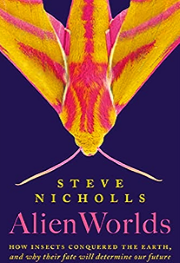Alien Worlds: How Insects Conquered the Earth and Why Their Fate Will Determine Our Future

Steve Nicholls
Head of Zeus, £35.00
One of the best reads I have undertaken in 2023, the author oozes knowledge and enthusiasm about all things insects. It’s no surprise when you read that Nicholls holds a PhD in dragonflies and has studied insects for 50 years – 30 of those spent making wildlife films.
Alien Worlds features a comprehensive introduction and 11 fascinating chapters enhanced by excellent colour photographs. Each chapter is standalone and I particularly enjoyed chapters six (Flower Power) and 11 (Superorganism).
On the coevolution of animals and plants, we read how they have taken millions of years to evolve finely tuned mechanisms. Getting the balance right for plants is especially important when enlisting the help of insects as pollinators (think about feeding the ever-increasing world population) or protectors. An example of plants providing food for protection is the production of seeds fitted with a fleshy cap, or elaiosome, containing essential nutrients. These are attractive to ants, which carry the seeds back to the nest, bite off the elaiosome, feed it to their larvae, then discard the rest of the seed in the nest, where t is safe.
The chapter that focuses on superorganisms considers the thousands of individuals (say termites or unrelated ants) following their own prescribed rules, which creates a type of common psyche that results in the complex colonies that have inspired architects and engineers to produce energy-efficient buildings: despite their tiny size, it has been speculated that ant and termite superorganisms exert a massive influence on their environments.
Dr Stephen Hoskins CBiol FRSB


